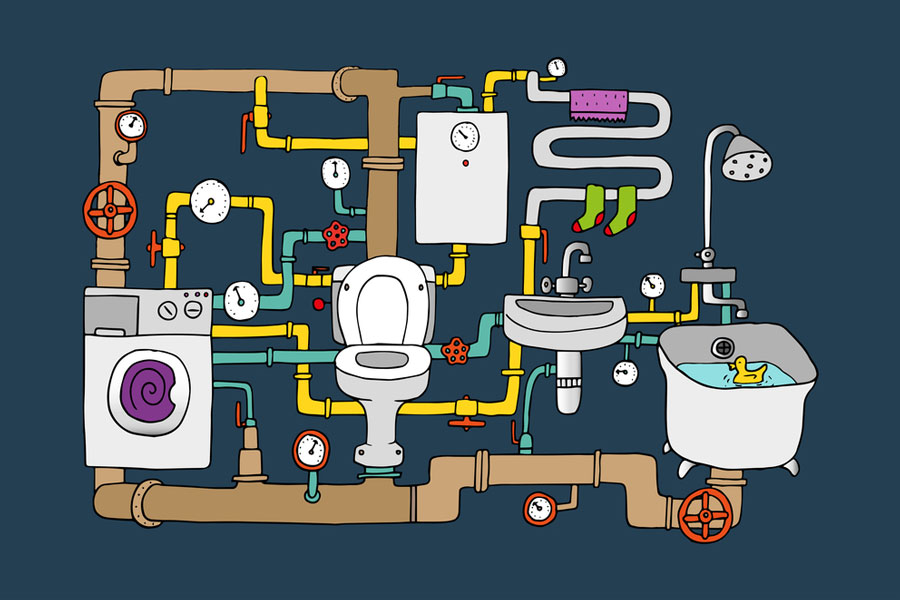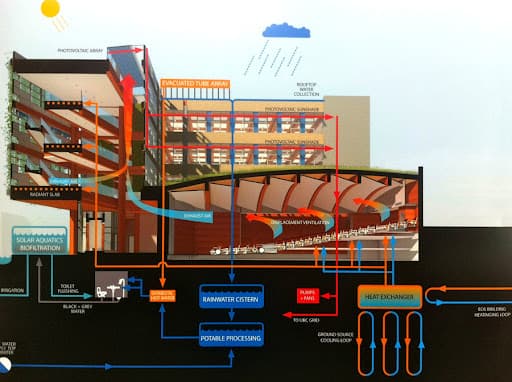The Essential Components of Your House's Plumbing System
Click On This LinkWhat're your thoughts on The Inner Workings of Your Home's Plumbing?

Comprehending exactly how your home's pipes system functions is important for every home owner. From delivering clean water for alcohol consumption, cooking, and showering to safely getting rid of wastewater, a well-kept pipes system is important for your family members's health and comfort. In this detailed overview, we'll explore the elaborate network that composes your home's pipes and offer suggestions on maintenance, upgrades, and managing common problems.
Intro
Your home's plumbing system is greater than just a network of pipes; it's a complicated system that guarantees you have accessibility to tidy water and efficient wastewater removal. Understanding its components and just how they collaborate can assist you avoid costly repairs and ensure every little thing runs efficiently.
Fundamental Parts of a Plumbing System
Pipes and Tubing
At the heart of your pipes system are the pipelines and tubes that carry water throughout your home. These can be made of numerous materials such as copper, PVC, or PEX, each with its benefits in regards to durability and cost-effectiveness.
Fixtures: Sinks, Toilets, Showers, etc.
Fixtures like sinks, toilets, showers, and tubs are where water is utilized in your home. Comprehending exactly how these fixtures link to the plumbing system helps in identifying troubles and planning upgrades.
Valves and Shut-off Points
Shutoffs regulate the circulation of water in your plumbing system. Shut-off valves are crucial during emergency situations or when you require to make repair work, permitting you to separate parts of the system without interfering with water circulation to the whole house.
Supply Of Water System
Main Water Line
The major water line links your home to the community water supply or an exclusive well. It's where water enters your home and is dispersed to numerous components.
Water Meter and Stress Regulatory Authority
The water meter procedures your water usage, while a pressure regulatory authority ensures that water moves at a safe pressure throughout your home's pipes system, preventing damage to pipelines and components.
Cold Water vs. Hot Water Lines
Understanding the distinction in between cold water lines, which provide water directly from the primary, and hot water lines, which bring heated water from the water heater, aids in troubleshooting and planning for upgrades.
Water drainage System
Drain Piping and Traps
Drain pipes lug wastewater far from sinks, showers, and bathrooms to the sewer or septic system. Traps prevent sewer gases from entering your home and additionally catch particles that might cause obstructions.
Ventilation Pipes
Air flow pipes permit air into the water drainage system, stopping suction that can slow down drainage and trigger catches to vacant. Appropriate ventilation is necessary for maintaining the honesty of your plumbing system.
Relevance of Appropriate Drainage
Making sure proper water drainage avoids back-ups and water damage. On a regular basis cleansing drains pipes and preserving catches can avoid pricey repair work and expand the life of your plumbing system.
Water Heater
Types of Water Heaters
Water heaters can be tankless or typical tank-style. Tankless heating units warm water as needed, while tanks keep heated water for instant usage.
Just How Water Heaters Attach to the Plumbing System
Understanding how water heaters link to both the cold water supply and hot water distribution lines helps in diagnosing problems like inadequate warm water or leakages.
Maintenance Tips for Water Heaters
Frequently purging your hot water heater to eliminate debris, examining the temperature level setups, and evaluating for leaks can prolong its lifespan and boost power effectiveness.
Usual Plumbing Issues
Leaks and Their Causes
Leaks can take place as a result of aging pipelines, loosened fittings, or high water pressure. Addressing leakages quickly prevents water damages and mold development.
Obstructions and Obstructions
Clogs in drains pipes and bathrooms are frequently brought on by purging non-flushable items or a buildup of oil and hair. Using drainpipe screens and bearing in mind what decreases your drains can avoid clogs.
Indicators of Pipes Issues to Watch For
Low water stress, slow drains, foul odors, or abnormally high water bills are indications of possible plumbing issues that must be addressed immediately.
Plumbing Upkeep Tips
Regular Examinations and Checks
Schedule yearly plumbing assessments to catch concerns early. Look for indicators of leaks, rust, or mineral build-up in faucets and showerheads.
Do It Yourself Maintenance Tasks
Simple jobs like cleaning tap aerators, looking for bathroom leaks utilizing color tablets, or protecting exposed pipes in chilly environments can prevent significant plumbing problems.
When to Call an Expert Plumber
Know when a plumbing problem calls for specialist proficiency. Attempting complex repair work without appropriate understanding can result in more damage and higher repair service costs.
Upgrading Your Pipes System
Factors for Upgrading
Upgrading to water-efficient components or replacing old pipes can enhance water top quality, lower water bills, and increase the value of your home.
Modern Pipes Technologies and Their Benefits
Check out technologies like wise leakage detectors, water-saving toilets, and energy-efficient hot water heater that can conserve money and lower environmental influence.
Expense Factors To Consider and ROI
Determine the ahead of time costs versus long-lasting savings when thinking about pipes upgrades. Many upgrades pay for themselves with lowered utility expenses and less repairs.
Ecological Effect and Preservation
Water-Saving Fixtures and Home Appliances
Mounting low-flow faucets, showerheads, and toilets can substantially decrease water usage without compromising efficiency.
Tips for Decreasing Water Usage
Easy habits like fixing leaks quickly, taking much shorter showers, and running complete lots of washing and meals can preserve water and reduced your energy costs.
Eco-Friendly Pipes Options
Think about sustainable plumbing products like bamboo for floor covering, which is durable and green, or recycled glass for counter tops.
Emergency Readiness
Steps to Take Throughout a Pipes Emergency
Know where your shut-off shutoffs lie and how to turn off the water in case of a burst pipe or significant leakage.
Value of Having Emergency Situation Calls Useful
Maintain get in touch with information for neighborhood plumbings or emergency situation services conveniently available for fast reaction throughout a pipes situation.
DIY Emergency Situation Fixes (When Appropriate).
Temporary solutions like utilizing air duct tape to spot a leaking pipeline or placing a pail under a leaking tap can decrease damages until a specialist plumbing shows up.
Verdict.
Recognizing the anatomy of your home's plumbing system encourages you to keep it efficiently, conserving money and time on repairs. By complying with routine upkeep routines and staying notified concerning modern plumbing innovations, you can ensure your plumbing system runs efficiently for years to come.
Understanding Your Home Plumbing System: A Comprehensive Guide
Plumbing System: The Lifeline of Your Home
At its core, the plumbing system is designed to perform two primary functions: bring fresh water into your home and remove wastewater. The system is a network of pipes, fixtures, and other components that transport water and sewage. Residential plumbing systems include potable water supply lines, drain-waste-vent (DWV) systems, and various plumbing fixtures that make water use in daily tasks possible.
Key Components:
Water Supply: This part of your plumbing system brings municipal water into your home, passing through the main water supply line. It s responsible for supplying all water needs, from drinking to bathing.
Drainage System: It carries waste and water away from your home to the sewer or septic system. This system includes all the piping within your home that leads to external sewage or septic systems.
Vent System: An essential yet often overlooked component, the vent system allows sewer gases to escape and lets air into the drainpipes, ensuring water and waste move correctly through the system.
Fixture: More Than Just Taps and Toilets
Plumbing fixtures are the most interactive parts of the plumbing system, including faucets, showers, toilets, and sinks. Each fixture is connected to the plumbing system and plays a role in either the delivery of freshwater or the disposal of waste and wastewater.
Types of Fixtures:
Faucets and Sinks: Used for washing hands, dishes, and other daily water needs.
Toilets: Dispose of human waste through the sewage system.
Bathtubs and Showers: Provide bathing facilities, requiring both hot and cold water supply.
Water Supply: The Source of Life
The water supply system is a critical component, ensuring that potable water is available throughout your home for various uses, including drinking, cooking, and cleaning. This system consists of pipes that distribute water to different parts of the house, controlled by valves to regulate the water flow.
Types of Plumbing: Materials and Methods
Various types of plumbing systems and materials are used in residential settings, each with its advantages and applications. From copper and PVC pipes for water supply to cast iron and ABS for drainage, the choice of materials can impact the longevity and efficiency of your plumbing system.
https://intownplumbingtx.com/articles/home-plumbing-system-guide/

Understanding Your Home Plumbing System: A Comprehensive Guide
Plumbing System: The Lifeline of Your Home
At its core, the plumbing system is designed to perform two primary functions: bring fresh water into your home and remove wastewater. The system is a network of pipes, fixtures, and other components that transport water and sewage. Residential plumbing systems include potable water supply lines, drain-waste-vent (DWV) systems, and various plumbing fixtures that make water use in daily tasks possible.
Key Components:
Water Supply: This part of your plumbing system brings municipal water into your home, passing through the main water supply line. It s responsible for supplying all water needs, from drinking to bathing.
Drainage System: It carries waste and water away from your home to the sewer or septic system. This system includes all the piping within your home that leads to external sewage or septic systems.
Vent System: An essential yet often overlooked component, the vent system allows sewer gases to escape and lets air into the drainpipes, ensuring water and waste move correctly through the system.
Fixture: More Than Just Taps and Toilets
Plumbing fixtures are the most interactive parts of the plumbing system, including faucets, showers, toilets, and sinks. Each fixture is connected to the plumbing system and plays a role in either the delivery of freshwater or the disposal of waste and wastewater.
Types of Fixtures:
Water Supply: The Source of Life
The water supply system is a critical component, ensuring that potable water is available throughout your home for various uses, including drinking, cooking, and cleaning. This system consists of pipes that distribute water to different parts of the house, controlled by valves to regulate the water flow.
Types of Plumbing: Materials and Methods
Various types of plumbing systems and materials are used in residential settings, each with its advantages and applications. From copper and PVC pipes for water supply to cast iron and ABS for drainage, the choice of materials can impact the longevity and efficiency of your plumbing system.
https://intownplumbingtx.com/articles/home-plumbing-system-guide/
I hope you enjoyed reading our topic on The Inner Workings of Your Home's Plumbing. Thank you for taking time to read through our piece. Don't hesitate to pause to share this content if you appreciated it. Thanks so much for your time spent reading it.
Click For More Info